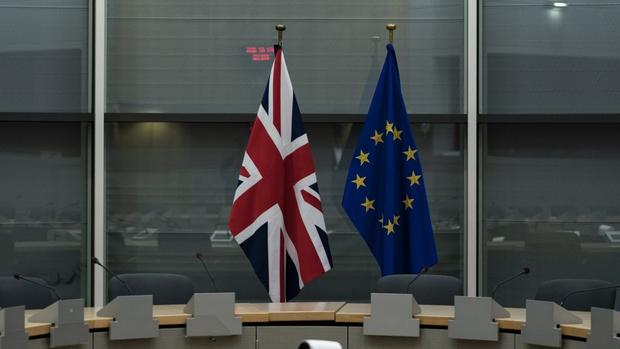 In this Sept 20, 2019 photo, the flag of the UK and the flag of EU are displayed prior to the meeting between UK Brexit Minister Stephen Barclay and EU chief Brexit negotiator Michel Barnier in Brussels. (KENZO TRIBOUILLARD / POOL / AFP)
In this Sept 20, 2019 photo, the flag of the UK and the flag of EU are displayed prior to the meeting between UK Brexit Minister Stephen Barclay and EU chief Brexit negotiator Michel Barnier in Brussels. (KENZO TRIBOUILLARD / POOL / AFP)
Europe's financial sector will be facing "peak uncertainty" as financial regulators and players prepare for the harshest effects of Brexit, which will see the United Kingdom complete its departure from the European Union by the end of December.
A combination of politics around trade talks, EU concerns about Britain diverging from continental rules, and Europe's push for greater control of euro-denominated activities has left the sector facing unanswered questions about its operations after Jan 1, a Financial Times report said.
"This is the period of peak uncertainty," David Schwimmer, chief executive of the London Stock Exchange Group, told the Financial Times.
ALSO READ: EU leaders urged to step up preparations for no-deal Brexit
The United Kingdom's finance sector is expected to be hit by uncertainty over the future of its market access, with the UK departing from the European Union with or without a trade deal in place.
Financial services fall outside the range of Brexit trade talks, and so the effects on banks and regulators of the UK exiting from the EU single market on Jan 1 leave unanswered vexing questions about their operations.
The possibility Britain could diverge from the current rules and regulations has left the sector in a lingering state of ambiguity, the Financial Times reported.
Less fragmentation and more cooperation and continuity of service are in everyone's interest.
David Schwimmer, chief executive of the London Stock Exchange Group
"It looks like the EU will make sure there is a cost to Brexit, but it's really important for global business to be able to participate in the biggest markets," Schwimmer said.
"Less fragmentation and more cooperation and continuity of service are in everyone's interest."
The EU was against UK proposals to include a regulatory cooperation element in the trade talks, despite its importance to the British and European economies. The EU argues that the British might find a way to retain market access indirectly.
It's understood the two sides might agree on so-called equivalency rules that will allow the cross-border share trading market to remain intact, but due to political sensitivities, a decision on that would not come while trade talks are undecided.
"It will go to the wire," one senior executive at a European bank told the Financial Times. "We're expecting to hear something concrete from the European Commission near the end of the year."
As the biggest share trading center in Europe, London handles as much as 30 percent of the 40 billion euro (US$47 billion) daily market.
Without equivalence, EU-based institutions will be barred from trading in London, and so some trading might move to cities such as Amsterdam and Paris.
It was reported on Tuesday that the EU chief negotiator, Michel Barnier, threatened to pull out of the trade talks that remain stalled over fishing rights and state aid for companies, or the so-called level playing field.
European Commission President Ursula von der Leyen told the European Parliament the bloc is prepared for the UK to leave without a trade deal.
READ MORE: Canada, UK strike interim post-Brexit trade deal
Contact the writer at jonathan@mail.chinadailyuk.com


